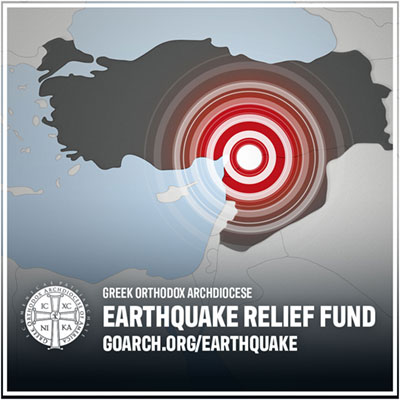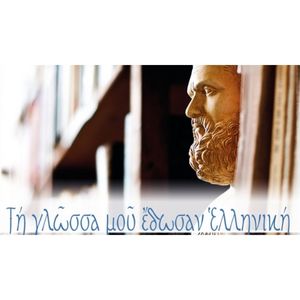This holy Father, who was from Melitene of Armenia, was a blameless man, just, reverent, sincere, and most gentle. Consecrated Bishop of Sebastia in 357, he was later banished from his throne and departed for Beroea of Syria (this is the present-day Aleppo). After the Arian bishop of Antioch had been deposed, the Orthodox and the Arians each strove to have a man of like mind with themselves become the next Bishop of Antioch. Meletius was highly esteemed by all, and since the Arians believed him to share their own opinion, they had him raised to the throne of Antioch. As soon as he had taken the helm of the Church of Antioch, however, he began preaching the Son's consubstantiality with the Father. At this, the archdeacon, an Arian, put his hand over the bishop's mouth; Meletius then extended three fingers towards the people, closed them, and extended one only, showing by signs the equality and unity of the Trinity. The embarrassed archdeacon then seized his hand, but released his mouth, and Meletius spoke out even more forcibly in defense of the Council of Nicaea. Shortly after, he was banished by the Arian Emperor Constantius, son of Saint Constantine the Great. After the passage of time, he was recalled to his throne, but was banished again the third time by Valens. It was Saint Meletius who ordained Saint John Chrysostom reader and deacon in Antioch (see Nov. 13). He lived until the Second Ecumenical Council in 381 (which was convoked against Macedonius, Patriarch of Constantinople, the enemy of the Holy Spirit), over which he presided, being held in great honor as a zealot of the Faith and a venerable elder hierarch.
Some time before, when the Emperor Gratian had made the Spanish General Theodosius commander-in-chief of his armies in the war against the barbarians, Theodosius had a dream in which he saw Meletius, whom he had never met, putting upon him the imperial robe and crown. Because of Theodosius's victories, Gratian made him Emperor of the East in Valens' stead in 379. When, as Emperor, Saint Theodosius the Great convoked the Second Ecumenical Council in Constantinople two years later, he forbade that anyone should tell him who Meletius was; and as soon as he saw him, he recognized him, ran to him with joy, embraced him before all the other bishops, and told him of his dream.
While at the Council, Saint Meletius fell ill and reposed a short while after. Saint Gregory of Nyssa, among others, gave a moving oration at his funeral; bewailing the loss of him whom all loved as a father, he said, "Where is that sweet serenity of his eyes? Where that bright smile upon his lips? Where that kind right hand, with fingers outstretched to accompany the benediction of the mouth?" (PG 46:8-6). And he lamented, "Our Elias has been caught up, and no Elisseus is left behind in his place." (ibid., 860). The holy relics of Saint Meletius were returned to Antioch and were buried beside Saint Babylas the Martyr (see Sept. 4), in the Church dedicated to the Martyr which Meletius, in his zeal for the Martyr's glory, had helped build with his own hands.


 New York - His Eminence Archbishop Elpidophoros of America announces the Greek Orthodox Archdiocese Earthquake Relief Fund, a fundraising effort by the Greek Orthodox Archdiocese of America to provide humanitarian aid to the victims of the recent earthquakes in Türkiye and Syria.
New York - His Eminence Archbishop Elpidophoros of America announces the Greek Orthodox Archdiocese Earthquake Relief Fund, a fundraising effort by the Greek Orthodox Archdiocese of America to provide humanitarian aid to the victims of the recent earthquakes in Türkiye and Syria.
 On February 9 we celebrate international Greek language day. Started in 2017 to coincide with the annual commemoration of Greece’s national poet, Dionysios Solomos (April 8, 1798 – February 9, 1857), whose lyrics are featured in the Greek National Anthem, International Greek Language Day aims to promote awareness of the language’s unparalleled influence on other writing systems around the world.
On February 9 we celebrate international Greek language day. Started in 2017 to coincide with the annual commemoration of Greece’s national poet, Dionysios Solomos (April 8, 1798 – February 9, 1857), whose lyrics are featured in the Greek National Anthem, International Greek Language Day aims to promote awareness of the language’s unparalleled influence on other writing systems around the world.